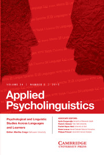
APPLIED PSYCHOLINGUISTICS
Scope & Guideline
Exploring the Nexus of Language and Mind
Introduction
Aims and Scopes
- Language Acquisition and Development:
Research on how individuals, particularly children, acquire and develop language skills, including studies on bilingualism, morphological awareness, and vocabulary development. - Cognitive Processes in Language:
Investigations into the cognitive mechanisms underlying language processing, including working memory, executive function, and perceptual influences on language comprehension. - Sociolinguistic Factors:
Exploration of how social factors, such as dialect proficiency, socioeconomic status, and bilingualism, affect language use and acquisition. - Pragmatics and Communication:
Studies examining pragmatic competence, speech acts, and the social aspects of language use, particularly in second language contexts. - Experimental and Eye-tracking Studies:
Utilization of experimental methodologies, including eye-tracking and behavioral studies, to understand real-time language processing and comprehension.
Trending and Emerging
- Bilingualism and Multilingualism:
There is an increasing emphasis on the nuances of bilingual and multilingual language experiences, including the cognitive and social implications of bilingualism on language processing and development. - Individual Differences in Language Learning:
Research exploring individual variation in language acquisition and processing is gaining traction, focusing on how personal experiences and cognitive traits influence language outcomes. - The Role of Technology in Language Learning:
Emerging studies are examining the impact of technology, such as apps and online tools, on language acquisition and usage, reflecting broader shifts in educational practices. - Neuroscience and Language Processing:
There is a rising interest in integrating neuroscience perspectives into psycholinguistic research, particularly concerning how brain functions relate to language processing and learning. - Contextual and Sociocultural Influences on Language:
Research increasingly considers the sociocultural context of language use, examining how factors such as community, identity, and social interaction shape language learning and processing.
Declining or Waning
- Traditional Grammar Instruction:
Research specifically dedicated to traditional grammar instruction methods seems to have decreased, as the focus shifts toward more holistic and context-based approaches to language learning. - Language Learning in Monolingual Contexts:
Studies solely focused on monolingual language contexts are less prevalent, indicating a growing interest in bilingualism and multilingualism as dominant themes. - Static Approaches to Language Assessment:
The emphasis on fixed assessments of language proficiency is waning, with more researchers advocating for dynamic and context-sensitive evaluations of language use.
Similar Journals
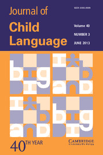
JOURNAL OF CHILD LANGUAGE
Connecting Scholars in the Journey of Child Language ResearchJOURNAL OF CHILD LANGUAGE, published by Cambridge University Press, is a premier scholarly journal dedicated to the exploration and examination of language development in children. Since its inception in 1974, the journal has become an authoritative source in the fields of Developmental and Educational Psychology, Experimental and Cognitive Psychology, and Linguistics, boasting significant impact as evidenced by its ranking in the top quartiles across these domains. With an impressive impact factor and a commitment to advancing research, the journal serves as a vital platform for researchers, educators, and practitioners interested in the intricacies of language acquisition and cognitive development in children. The 2023 Category Quartiles place it in Q1 for Linguistics and Language, further establishing its excellence. Fostering a rich intellectual community, the journal invites contributions that advance our understanding of child language, promising a broad readership in both the social sciences and humanities.
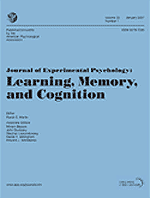
JOURNAL OF EXPERIMENTAL PSYCHOLOGY-LEARNING MEMORY AND COGNITION
Transforming insights into understanding.JOURNAL OF EXPERIMENTAL PSYCHOLOGY-LEARNING MEMORY AND COGNITION is a premier publication of the American Psychological Association, focused on the intricate mechanisms of learning, memory, and cognition. Established in 1975, this esteemed journal has consistently delivered impactful research, evidenced by its Q1 ranking in both Experimental and Cognitive Psychology and Linguistics and Language categories for 2023. With an impressive impact factor and ranked in the top percentiles of multiple fields, it serves as a crucial resource for researchers, professionals, and students who aspire to deepen their understanding of cognitive processes. The journal’s rigorous peer-review process ensures that only the most innovative and high-quality studies are published, providing a platform for groundbreaking findings that advance the field. Though not open access, the insights within each issue are invaluable for anyone interested in the dynamics of human cognition and memory.

JOURNAL OF MEMORY AND LANGUAGE
Illuminating the Pathways of Thought and CommunicationJOURNAL OF MEMORY AND LANGUAGE, published by Academic Press Inc Elsevier Science, is a prestigious journal dedicated to advancing the understanding of cognitive processes related to language and memory. With an impact factor that underscores its authority and relevance, the journal has achieved remarkable recognition, ranking in the Q1 quartile across multiple disciplines such as Artificial Intelligence, Experimental and Cognitive Psychology, Linguistics and Language, and Neuropsychology and Physiological Psychology, as of 2023. With its origins tracing back to 1985, the journal continually provides a platform for high-quality research and innovative studies that intersect diverse fields including cognitive science and linguistics. Although it does not offer open access, the Journal of Memory and Language serves as an essential resource for researchers and professionals seeking to explore the intricate interplay between memory and language. Make sure to access state-of-the-art research that not only informs theoretical frameworks but also has practical implications in real-world situations.
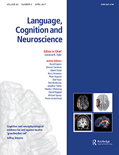
Language Cognition and Neuroscience
Fostering Interdisciplinary Dialogue in Language and NeuroscienceLanguage Cognition and Neuroscience is a premier peer-reviewed journal published by ROUTLEDGE JOURNALS, TAYLOR & FRANCIS LTD, focusing on the intersection of linguistics, cognitive psychology, and neuroscience. Since its inception in 2013, this journal has established itself as a vital resource for researchers and scholars, contributing significantly to the understanding of how language is processed and represented in the brain. With its impressive rankings in various categories—Q1 in Linguistics and Language, Q2 in Cognitive Neuroscience, and Experimental and Cognitive Psychology—it caters to a diverse and interdisciplinary audience. The journal is accessible to readers worldwide, effectively communicating cutting-edge research and innovative methodologies in the field. Open Access options enable broader disseminations of knowledge, ensuring that significant findings reach both academic and practical applications. With a commitment to high-quality research, Language Cognition and Neuroscience continues to be an influential platform for advancing theories and practices within cognitive science and language studies.

JOURNAL OF PSYCHOLINGUISTIC RESEARCH
Advancing Insights in Psycholinguistic ResearchJOURNAL OF PSYCHOLINGUISTIC RESEARCH is a premier scholarly publication dedicated to the interdisciplinary exploration of language and cognition. Established in 1971 and published by Springer/Plenum Publishers, this journal serves as a vital platform for researchers in Experimental and Cognitive Psychology, Linguistics, and related fields. With an impressive reputation reflected in its 2023 Category Quartiles—Q3 in Experimental and Cognitive Psychology, Q1 in Linguistics and Language, and Q2 in Psychology (miscellaneous)—the journal ranks prominently within the Scopus database, reaching the 88th percentile in Language and Linguistics. Researchers and professionals have the opportunity to disseminate their findings effectively, enriching contemporary understanding of psycholinguistic phenomena through rigorous peer-reviewed articles. Although currently not an open-access journal, it provides extensive access options that cater to a global audience, ensuring that the latest research is readily available to those dedicated to advancing this dynamic field. We invite scholars, practitioners, and students to engage with this essential resource for fresh insights and innovative research methodologies.
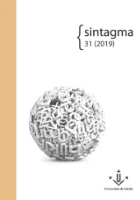
Sintagma
Fostering Academic Dialogue in Linguistics.Sintagma is a prominent academic journal dedicated to advancing the field of Linguistics and Language, published by the Universitat de Lleida in Spain. With an ISSN of 0214-9141 and an E-ISSN of 2013-6455, this journal has established itself as an open-access platform since 1989, thereby ensuring wide accessibility and dissemination of research. The journal's commitment to quality is reflected in its ranking within the Q4 quartile of Linguistics and Language in 2021 and a similar standing in Social Sciences and Arts and Humanities, which underscores its emerging importance in these fields despite recent challenges. Covering topics that span theoretical inquiries to applied linguistic studies, Sintagma invites researchers, professionals, and students to contribute to and engage with its evolving landscape from its unique academic perspective. With the convergence of research years from 2011 to 2018 and upcoming issues through 2024, the journal remains poised to provide insightful content that addresses the linguistic dimensions of contemporary society.

Journal of Cultural Cognitive Science
Innovating Research at the Culture-Cognition NexusThe Journal of Cultural Cognitive Science, published by SpringerNature, is an esteemed forum for researchers and scholars dedicated to exploring the intersection of culture, cognition, and language. With its ISSN 2520-100X and E-ISSN 2520-1018, this journal has made significant strides since its inception in 2017, covering a wide array of topics pertinent to Experimental and Cognitive Psychology and Linguistics and Language. Notably, it has achieved remarkable recognition, ranking in the Q3 category for Experimental and Cognitive Psychology and Q1 for Linguistics and Language in 2023. Its Scopus ranks further illustrate its impact, with the journal positioned at the 89th percentile in Social Sciences - Linguistics and Language and 47th percentile in Psychology. Despite its ongoing journey, it continues to foster open dialogue and innovation among professionals, researchers, and students, providing valuable insights and advancing knowledge in the field.
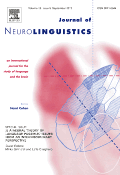
JOURNAL OF NEUROLINGUISTICS
Illuminating the Neurological Foundations of Linguistic ThoughtJOURNAL OF NEUROLINGUISTICS, published by Pergamon-Elsevier Science Ltd, is a premier academic journal that rigorously explores the intersection of language and the brain, emphasizing the cognitive and neurological underpinnings of linguistic processes. With an ISSN of 0911-6044 and an E-ISSN of 1873-8052, this journal has established itself as a crucial resource for researchers, professionals, and students in the fields of linguistics, cognitive neuroscience, and psychology. Boasting an impressive Q1 classification in Linguistics and Language and Arts and Humanities (miscellaneous) for 2023, the journal demonstrates significant impact, having achieved a ranking within the 91st percentile in Linguistics and Language according to Scopus rankings. The scope of the journal spans comprehensive studies from 1985 to 2025, reflecting a long-standing commitment to advancing the understanding of how language interacts with human cognition. Although it does not currently offer open access, its relevance extends well beyond its articles, contributing to ongoing scholarly dialogues and fostering new insights in the study of neurolinguistics.
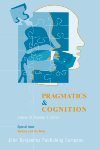
Pragmatics & Cognition
Bridging Disciplines Through Language and CognitionPragmatics & Cognition, published by John Benjamins Publishing Co, is an esteemed journal that serves as a cross-disciplinary platform for the study of language, cognition, and context-dependent communication. With its ISSN 0929-0907 and E-ISSN 1569-9943, the journal has established a notable reputation since its inception in 1993, although its coverage spans various fields from behavioral neuroscience to linguistics and philosophy. Recognized for its scholarly contributions, it holds impressive Scopus rankings, significantly within Linguistics and Language, where it ranks in the 63rd percentile among peers. Although it currently maintains a Q4 designation in Behavioral Neuroscience and a Q1 in Linguistics and Language as of 2023, the journal appeals to a diverse audience addressing the intricate relationships between language use and cognitive processes. As researchers and academics navigate this evolving landscape, Pragmatics & Cognition remains pivotal in fostering essential dialogues and advancing knowledge in the interdisciplinary field, providing rich content that is both insightful and relevant.

Language and Cognition
Exploring the Intersection of Language and MindLanguage and Cognition is a premier peer-reviewed journal published by Cambridge University Press, dedicated to advancing the fields of language, linguistics, and cognitive psychology. With an ISSN of 1866-9808 and E-ISSN of 1866-9859, it has rapidly established itself as a pivotal resource for researchers, educators, and practitioners alike. Recognized for its rigorous scholarship, the journal holds a Q1 ranking in Linguistics and Language and a Q2 ranking in Experimental and Cognitive Psychology for 2023, reflecting its esteemed positioning within the academic community. Since transitioning to open access in 2023, it has broadened its reach, making cutting-edge research accessible to a global audience. The journal's emphasis on interdisciplinary studies ensures a comprehensive exploration of the interactions between language and cognitive processes, fostering deeper insights and fostering collaboration across domains. Researchers and professionals looking to stay at the forefront of advancements in these vital areas will find Language and Cognition an invaluable platform for disseminating their findings and engaging with contemporary debates.